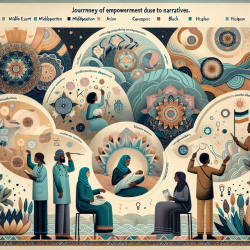Introduction
Perinatal mental health is a critical area of concern, affecting approximately 10% of pregnant women and 13% of new mothers globally. Despite its prevalence, many women suffer in silence due to stigma, lack of awareness, and insufficient professional intervention. The research article "Dread and solace: Talking about perinatal mental health" sheds light on the narratives of women experiencing perinatal mental health issues, offering valuable insights for practitioners.
Understanding the Research
The study conducted narrative interviews with women across two Canadian provinces, aiming to explore how cultural and personal narratives around motherhood can be both a source of distress and a pathway to healing. The researchers identified four key themes:
- Feeling like a failed mother: Many women struggle with the pressure to meet societal expectations of the 'perfect mother,' leading to feelings of inadequacy and failure.
- Societal silencing: Negative experiences of motherhood are often suppressed, creating a barrier to open discussion and support.
- New sense of self: Women often undergo a transformation in identity, reconciling their pre-motherhood self with their new role.
- Solace in shared experiences: Sharing stories with others who have faced similar challenges can be a powerful tool for healing and self-care.
Implications for Practitioners
Practitioners can enhance their skills by integrating the findings of this research into their practice. Here are some actionable steps:
- Encourage Narrative Sharing: Create safe spaces for women to share their stories. This can be through support groups, one-on-one sessions, or online forums. Listening to and validating these experiences can foster healing.
- Challenge Societal Norms: Help women recognize and challenge unrealistic societal expectations. Educate them about the diverse experiences of motherhood and normalize the struggles associated with it.
- Promote Self-Compassion: Encourage women to practice self-compassion and self-care. Help them understand that their feelings do not define their worth as mothers.
- Facilitate Peer Support: Connect women with peer support networks where they can share experiences and gain insights from others who have navigated similar challenges.
Encouraging Further Research
While this study provides valuable insights, there is still much to learn about perinatal mental health. Practitioners are encouraged to engage in further research to deepen their understanding and improve care. Exploring diverse cultural contexts, the impact of digital storytelling, and the role of healthcare systems in supporting perinatal mental health are potential areas for further investigation.
Conclusion
By embracing the power of narratives, practitioners can better support women experiencing perinatal mental health issues. Sharing stories not only helps women find solace but also empowers practitioners to provide more empathetic and effective care. To read the original research paper, please follow this link: Dread and solace: Talking about perinatal mental health.










